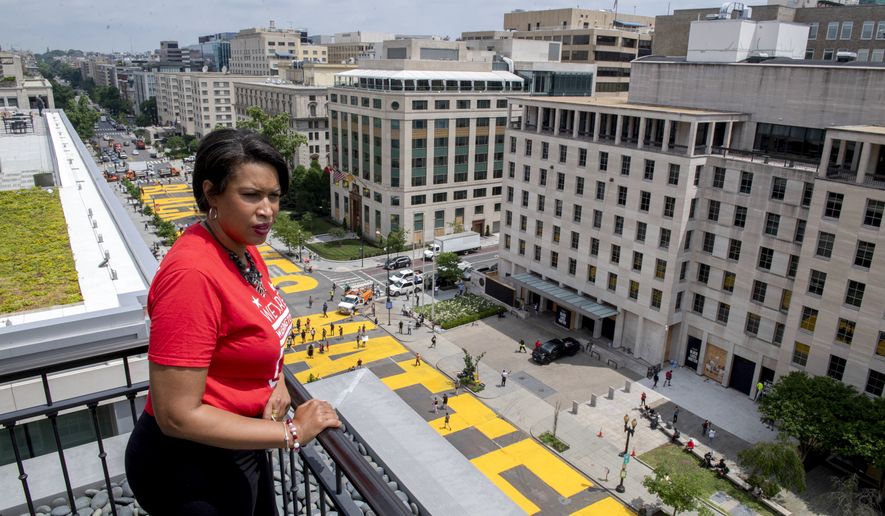The D.C. Council on Tuesday unanimously approved emergency legislation to overhaul law enforcement in the District amid calls for defunding police departments across the country.
Council member Charles Allen introduced the Comprehensive Policing and Justice Reform Emergency Amendment Act of 2020, which bans police chokeholds, bars the Metropolitan Police Department from buying military gear and allows incarcerated felons to vote, among other provisions.
As emergency legislation, it takes effect immediately and remains in effect for 90 days.
“The protests to the murders of George Floyd in Minneapolis, Breonna Taylor in Louisville and cruelly countless others are evidence of the immediate need to take action,” said Mr. Allen, Ward 6 Democrat and chairman of the Justice and Public Safety Committee.
The D.C. Police Union released a statement Monday opposing the bill, saying it will increase crime and cause a mass exodus of personnel. The labor union criticized the legislation for taking advantage of nationwide outrage over the death of George Floyd, who died May 25 after a Minneapolis officer knelt on his neck for nearly nine minutes.
“The proposed language in this bill erodes many of the rights that police officers in the city are currently afforded and creates a dangerous path to unchecked violence in the District,” the union said. “We understand there are voices in this community that are asking for continued reform to the police policy. The union is and always has been willing to have serious discussions about this kind of reform.”
D.C. Mayor Muriel Bowser, who has said she has no plans to defund the police department, reiterated her support for the legislation in a statement that Council Chairman Phil Mendelson read to the other lawmakers during their virtual meeting.
However, she expressed concern that provisions of the emergency legislation would change other laws without public input. For example, the bill expands public access to police officers’ body-worn camera footage and bars officers from reviewing footage while writing initial reports.
“Allowing for community input and vetting by our residents can only serve to refine and strengthen changes to policing in the District,” Miss Bowser wrote. “As I have indicated previously, I support the emergency legislation, but I asked the council to delay considerations of the temporary measure until public hearings can be held.”
The legislation also prohibits all members of the police complaint board from being affiliated with law enforcement and requires the D.C. Board of Elections to provide every person in the custody of the Department of Corrections with the means to vote in the Nov. 3 election.
Mr. Allen said several aspects of the bill have been discussed regularly in public hearings in his committee and that continued public input is welcome when the council takes up the permanent legislation.
Congress must approve all of the District’s permanent legislation, but the council can enact emergency legislation that bypasses that process and the mayor’s signature and remains in effect for 90 days. The council then can pass temporary legislation that would expire in 225 days but require two readings of the bill, as well as mayoral and congressional approval.
In more than an hour of debate over amendments, lawmakers expressed concern that the proposed additions were not being vetted thoroughly and asked that they be taken up in the second reading of temporary legislation in a couple of weeks or in the permanent legislation.
Three amendments from Mr. Mendelson were included in the bill, which bars MPD from hiring any officer with a history of misconduct in another department, makes disciplinary processes non-negotiable in union contracts and gives the director of the office of police complaints access to more information from the department.
Council member David Grosso, at-large independent, offered an amendment that would limit the number of police officers to 3,500. Right now, the department has about 3,800 officers.
Mr. Grosso said the District has the highest number of law enforcement officers per resident, at 55 officers per 10,000 residents, compared with other cities. New York City has 42 officers per 10,000 residents, and Chicago has 44, Baltimore has 40 and Boston has 31.
Mr. Allen asked why the number 3,500 was chosen. He said he doesn’t think the emergency legislation should include a cap on the number of officers without sufficient data, budget, policy and evidence to support it.
Mr. Grosso withdrew the amendment and asked Mr. Allen whether he would hold a hearing on a permanent bill that would decrease the number of police officers.
“What are you doing in an hour, Mr. Grosso? We have a hearing on the MPD budget to go over these numbers later today,” Mr. Allen said in a tense back-and-forth with Mr. Grosso.
Council members Anita Bonds, at-large Democrat, and Vincent Gray, Ward 7 Democrat, introduced an amendment that would establish a police reform commission. It was the only amendment that required a vote by the council.
Lawmakers who opposed the amendment said they feared that the report the board is required to produce by the end of the year would be used as a tool to delay conversation on immediate reforms.
The amendment, which was approved 7-5 vote, establishes a 20-member board with people from law enforcement, government agencies, nonprofits, education institutions, advisory neighborhood commissions, labor groups, and social service, religious and behavioral health organizations.
“Washington, D.C., is a segregated city even in this year 2020, it is still a segregated city,” said council member Kenyan McDuffie, Ward 5 Democrat. “It’s because race continues to shape every single aspect of our lives in this city: politically, economically, socially, culturally.”
Mr. McDuffie said he was proud of the legislation but added that it is important that the bill is not a “one-off.”
• Sophie Kaplan can be reached at skaplan@washingtontimes.com.




Please read our comment policy before commenting.